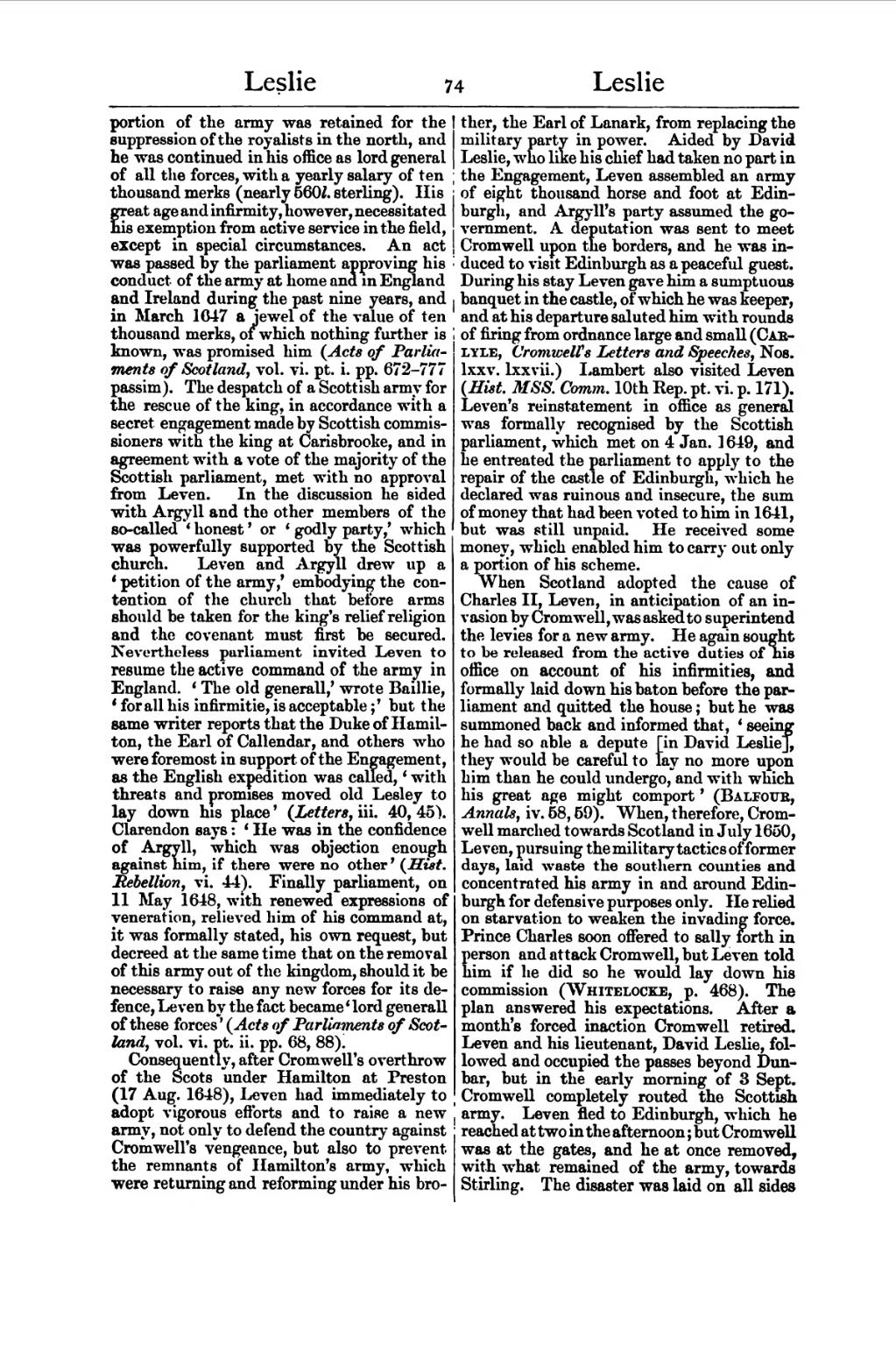portion of the army was retained for the suppression of the royalists in the north, and he was continued in his office as lord general of all the forces, with a yearly salary of ten thousand merks (nearly 560l. sterling). His great age and infirmity, however, necessitated his exemption from active service in the field, except in special circumstances. An act was passed by the parliament approving his conduct of the army at home and in England and Ireland during the past nine years, and in March 1647 a jewel of the value of ten thousand merks, of which nothing further is known, was promised him (Acts of Parliaments of Scotland, vol. vi. pt. i. pp. 672–777 passim). The despatch of a Scottish army for the rescue of the king, in accordance with a secret engagement made by Scottish commissioners with the king at Carisbrooke, and in agreement with a vote of the majority of the Scottish parliament, met with no approval from Leven. In the discussion he sided with Argyll and the other members of the so-called ‘honest’ or ‘godly party,’ which was powerfully supported by the Scottish church. Leven and Argyll drew up a ‘petition of the army,’ embodying the contention of the church that before arms should be taken for the king's relief religion and the covenant must first be secured. Nevertheless parliament invited Leven to resume the active command of the army in England. ‘The old generall,’ wrote Baillie, ‘for all his infirmitie, is acceptable;’ but the same writer reports that the Duke of Hamilton, the Earl of Callendar, and others who were foremost in support of the Engagement, as the English expedition was called, ‘with threats and promises moved old Lesley to lay down his place’ (Letters, iii. 40, 45). Clarendon says: ‘He was in the confidence of Argyll, which was objection enough against him, if there were no other’ (Hist. Rebellion, vi. 44). Finally parliament, on 11 May 1648, with renewed expressions of veneration, relieved him of his command at, it was formally stated, his own request, but decreed at the same time that on the removal of this army out of the kingdom, should it be necessary to raise any new forces for its defence, Leven by the fact became ‘lord generall of these forces’ (Acts of Parliaments of Scotland, vol. vi. pt. ii. pp. 68, 88).
Consequently, after Cromwell's overthrow of the Scots under Hamilton at Preston (17 Aug. 1648), Leven had immediately to adopt vigorous efforts and to raise a new army, not only to defend the country against Cromwell's vengeance, but also to prevent the remnants of Hamilton's army, which were returning and reforming under his brother, the Earl of Lanark, from replacing the military party in power. Aided by David Leslie, who like his chief had taken no part in the Engagement, Leven assembled an army of eight thousand horse and foot at Edinburgh, and Argyll's party assumed the government. A deputation was sent to meet Cromwell upon the borders, and he was induced to visit Edinburgh as a peaceful guest. During his stay Leven gave him a sumptuous banquet in the castle, of which he was keeper, and at his departure saluted him with rounds of firing from ordnance large and small (Carlyle, Cromwell's Letters and Speeches, Nos. lxxv. lxxvii.) Lambert also visited Leven (Hist. MSS. Comm. 10th Rep. pt. vi. p. 171). Leven's reinstatement in office as general was formally recognised by the Scottish parliament, which met on 4 Jan. 1649, and he entreated the parliament to apply to the repair of the castle of Edinburgh, which he declared was ruinous and insecure, the sum of money that had been voted to him in 1641, but was still unpaid. He received some money, which enabled him to carry out only a portion of his scheme.
When Scotland adopted the cause of Charles II, Leven, in anticipation of an invasion by Cromwell, was asked to superintend the levies for a new army. He again sought to be released from the active duties of his office on account of his infirmities, and formally laid down his baton before the parliament and quitted the house; but he was summoned back and informed that, ‘seeing he had so able a depute [in David Leslie], they would be careful to lay no more upon him than he could undergo, and with which his great age might comport’ (Balfour, Annals, iv. 58, 59). When, therefore, Cromwell marched towards Scotland in July 1650, Leven, pursuing the military tactics of former days, laid waste the southern counties and concentrated his army in and around Edinburgh for defensive purposes only. He relied on starvation to weaken the invading force. Prince Charles soon offered to sally forth in person and attack Cromwell, but Leven told him if he did so he would lay down his commission (Whitelocke, p. 468). The plan answered his expectations. After a month's forced inaction Cromwell retired. Leven and his lieutenant, David Leslie, followed and occupied the passes beyond Dunbar, but in the early morning of 3 Sept. Cromwell completely routed the Scottish army. Leven fled to Edinburgh, which he reached at two in the afternoon; but Cromwell was at the gates, and he at once removed, with what remained of the army, towards Stirling. The disaster was laid on all sides
